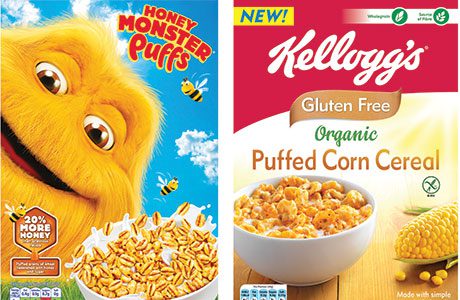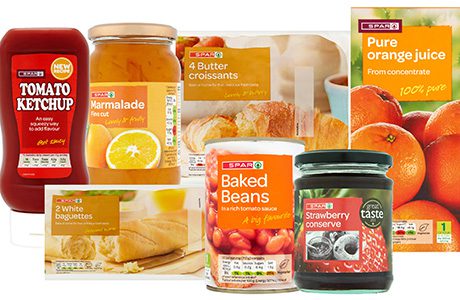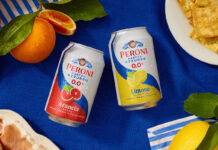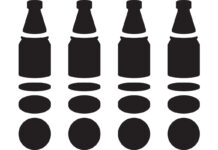
Cereal is the UK’s most popular breakfast food, but after a slump in sales, the fight is on to build a healthy image for the products.
BREAKFAST proved pretty resilient during the recession. With people looking to save money and avoid the expense of pricey lunchtime snacks, the economical and filling qualities of a good breakfast made it an attractive proposition.
However, growth hasn’t been felt everywhere. Despite apparently being the most popular breakfast food, boxed cereals’ sales suffered.
“Last year was quite tough for breakfast cereals in particular,” said Andy Valentine, marketing director at Halo Foods, the company behind Honey Monster Puffs, which changed its name from Sugar Puffs last year.
“Although the value of ready-to-eat cereals is still high, this dropped 6.3% from the previous year, with volume down 5.5%.
“The health perception in particular has impacted the breakfast cereals category. According to research Honey Monster did with mums, people have been particularly affected by the sugar debate. This is one of the main reasons why Honey Monster has worked hard to reformulate the recipe of Honey Monster Puffs, reducing sugar by over a third in the past decade and increasing the amount of honey by 20%.”
His advice to retailers is to highlight breakfast cereals’ health credentials.
“I think dialling up the health cues where possible is a great way to help aid parents when choosing what to feed their children – things such as honey and multi grains.”
Halo Foods isn’t the only cereals company to be concentrating on health.
Last month, Kellogg’s made its first move into free-from foods with the launch of its Gluten Free Organic Puffed Corn Cereal.
Research by Kantar and Mintel, quoted by Kellogg’s, shows that the free-from market is growing at 20% annually, attributed to 5% of people now buying free-from foods as part of what they see as a healthy lifestyle, rather than because of an intolerance to a particular ingredient.
Kellogg’s said it is initially looking to build credibility with loyal, frequent shoppers for gluten-free products.
A spokesperson said: “Shoppers have been crying out for a gluten-free cereal from Kellogg’s, and our new Puffed Corn Cereal gives us and our retail partners a brilliant opportunity to grow the free-from category.
“More and more shoppers want to make healthy choices, but most gluten-free products are manufactured by unfamiliar brands they’re not sure they can trust. Consumers want established, iconic brands they know in the free-from aisle to give them confidence that what they’re buying is quality and will taste great.”
Highlighting health and healthiness is a strategy that chimes with advice from Karen Levy, marketing executive for the Breakfast Week event that’s run by the Homegrown Cereals Authority (HGCA).
“When it comes to what we eat in the mornings, most foods are chosen because of the taste, but being filling is becoming an increasingly important driver of choice,” she said.
And consumer desire to eat foods that are regarded as having health benefits, for example high fibre or vitamin content, influences shopping choices too, she added.
So food manufacturers and retailers should concentrate on products that are convenient, filling and healthy and use their marketing activity to highlight those qualities.
YouGov data, quoted by HGCA, shows that during the week, breakfast cereal remains the UK’s most popular breakfast dish, accounting for 60% of in-home breakfasts. Bread or toast-based breakfasts come second, making up three in 10 breakfasts. Fruit is growing in popularity, as are breakfast biscuits. That’s thought to reflect growing demand for grab-and-go foods.
It seems there has also been a resurgence in cooked
breakfasts, with the most recent 12 months’ figures showing that eggs, bacon, sausages and beans were served on 142.4m more occasions than the year before – a 9.8% increase.
And research from Kantar Worldpanel, quoted by HGCA, suggests that while the rate of category growth has slowed slightly, the number of breakfasts consumed last year was still up. It was up 0.6% compared to the previous year.
However, Levy thinks there is still plenty of work that could be done to improve the sale of breakfast items.
“While we know that breakfast is becoming increasingly important to the consumer, our own research shows a quarter of people are still missing it once a week or more,” she said.
Susan Darbyshire, brand director for Spar UK, reckons retailers can help boost the sale of breakfast items by tying them in with occasions and events throughout the year.
“Over Christmas Spar retailers highlighted that they offered a range of handy breakfast items,” she said.
“Valentine’s Day, Mothers’ Day and Fathers’ Day are all taking place over the next few months. What better way for shoppers to show they care than rustling up a delicious homemade breakfast for their loved ones?”
“To help support these occasions, Spar offers its retailers themed POS materials.”






















